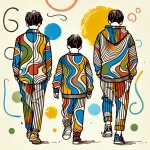CAN YOU CELEBRATE? [Can You Celebrate?]
安室奈美恵 [Amuro Namie]
Words & Music : 小室哲哉 [Komuro Tetsuya]
YouTube Search ” Can You Celebrate? – Namie Amuro “
Yesterday, I introduced Tetsuya Komuro, the central figure of TM Network, who provided many songs for “idols” even in the 80s. Around 1994, he began his activities in earnest as a producer. He wrote, composed, arranged, and produced music for many artists such as Ryoko Shinohara, TRF, Hitomi, H Jungle with t, globe, and Tomomi Kahara. Komuro was a pioneer of Japanese electronic dance music, establishing the category known as the “Komuro Family” and dominating the Japanese J-POP scene to such an extent that it could be called the “Komuro Boom.”
Namie Amuro, a singer and dancer from Okinawa wiki, is one of the central artists of the Komuro Family and is considered a superstar with overwhelming recognition in the Asian region.

“Can You Celebrate?” is Namie Amuro’s ninth single and the best-selling single produced by Tetsuya Komuro. It was created as the theme song for a TV drama about weddings and became extremely popular as a standard song for Japanese weddings. The word “celebrate” brings to mind a festive party, but the song, which is composed to fit both tearful and joyful scenes, makes it suitable for Japanese weddings.
The words used in this song are very common, making it recommended for Japanese learners.
Can you celebrate? Can you kiss me tonight?
We will love long long time
永遠ていう言葉なんて 知らなかったよね
eien te iu kotoba nante shiranakatta yo ne
(Can you celebrate? Can you kiss me tonight?)
(We will love long long time)
二人きりだね 今夜からは少し照れるよね
futarikiri da ne konya kara wa sukoshi tereru yo ne
- 永遠(えいえん) [eien] : eternity
- 言葉(ことば) [kotoba] : word
- 知る(しる) [shiru] : know
- 二人きり(ふたりきり) [futarikiri] : just the two of us
- 今夜(こんや) [konya] : tonight
- 少し(すこし) [sukoshi] : a little
- 照れる(てれる) [tereru] : be shy
(translation) “Can you celebrate? Can you kiss me tonight?
We will love long long time.
I didn’t know the word eternity.
Just the two of us, from tonight, it’s a bit embarrassing, right?”
“よね / yone” frequently appears as a sentence-ending particle. “よ / yo” and “ね / ne” are separate words, but when combined like this, they don’t differ from the use of “ね / ne” alone. In this song, it expresses the expectation of agreement or response from the other person.
“照れるよね / tereru yone” can be translated as “You feel shy, right?” It is a word often used to seek agreement from the other person, especially by a bride or groom who feels anxious before marriage, hoping that the partner feels the same way and seeking empathy. It is a very commonly used word and can give a friendlier impression, even if there is no desire for empathy.
Such subtle but crucial expressions are the essence of the Japanese language.

永く…永く… いつも見守っていてくれている誰かを
nagaku nagaku itsumo mimamotte ite kurete iru dareka o
探して見つけて 失ってまた探して
sagashite mitsukete ushinatte mata sagashite
- 長い・永い(ながい) [nagai] : long
- いつも [itsumo] : always
- 見守る(みまもる) [mimamoru] : watch over
- 誰か(だれか) [dareka] : someone
- 探す(さがす) [sagasu] : search
- 見つける(みつける) [mitsukeru] : find
- 失う(うしなう) [ushinau] : lose
(translation) “Long… long… always searching for someone who is watching over me,
finding, losing, and searching again.”
遠かった怖かったでも 時に素晴らしい
tōkatta kowakatta demo tokini subarashii
夜もあった 笑顔もあった どうしようもない 風に吹かれて
yoru mo atta egao mo atta dōshiyōmo nai kaze ni fukarete
生きてる今 これでもまだ 悪くはないよね
ikiteru ima kore demo mada waruku wa nai yo ne
- 遠い(とおい) [tōi] : distant
- 怖い(こわい) [kowai] : scary
- 時に(ときに) [tokini] : sometimes
- 素晴らしい(すばらしい) [subarashii] : wonderful
- 夜(よる) [yoru] : night
- ある [aru] : exist
- 笑顔(えがお) [egao] : smile
- どうしようもない [dōshiyōmonai] : hopeless
- 風(かぜ) [kaze] : wind
- 吹かれる(ふかれる) [fukareru] : be blown
- 生きる(いきる) [ikiru] : live
- 今(いま) [ima] : now
- 悪い(わるい) [warui] : bad
(translation) “Distant and scary, but sometimes there were wonderful nights,
there were smiles. Blown by the hopeless wind.
Living now, even this isn’t too bad, right?”
Here, “時に / tokini” means “sometimes,” not “when…”.
甘く切ない 若くて幼い 愛情ふり返れば
amaku setsunai wakakute osanai aijō furikaereba
けっこう可愛いね
kekkō kawaii ne
- 甘い(あまい) [amai] : sweet
- 切ない(せつない) [setsunai] : heartrending
- 若い(わかい) [wakai] : young
- 幼い(おさない) [osanai] : childish
- 愛情(あいじょう) [aijō] : affection
- 振り返る(ふりかえる) [furikaeru] : look back
- 結構(けっこう) [kekkō] : quite
- 可愛い(かわいい) [kawaii] : cute
(translation) “Sweet and heartrending. Young and childish. Looking back at the affection,
it’s quite cute.”
This does not make sense lol. But it’s nice that the words are easy to use.
“切ない / setsunai” is a poetic word often used by young people synonymously with “悲しい / kanashii (sad).” It is sometimes said to have a subtle nuance unique to the Japanese language.
間違いだらけの道順 なにかに逆らって走った
machigai darake no michijun nanika ni sakaratte hashitta
誰かが 教えてくれた
dareka ga oshiete kureta
- 間違い(まちがい) [machigai] : mistake
- だらけ [darake] : full of
- 道順(みちじゅん) [michijun] : route
- なにか [nanika] : something
- 逆らう(さからう) [sakarau] : go against
- 走る(はしる) [hashiru] : run
- 教える(おしえる) [oshieru] : teach
(translation) “A route full of mistakes, I ran against something.
Someone taught me.”
These are useful words when asking for directions while traveling in Japan.
(Can you celebrate? Can you kiss me tonight?)
(We will love long long time)
wo…想い出から ほんの少し 抜け出せずに
wo… omoide kara honno sukoshi nukedasezu ni
たたずんでる 訳もなくて 涙あふれ 笑顔こぼれてる
tatazunderu wake mo nakute namida afure egao koboreteru
- 思い出・想い出(おもいで) [omoide] : memory
- ほんの [honno] : just
- 少し(すこし) [sukoshi] : a little
- 抜け出す(ぬけだす) [nukedasu] : escape
- たたずむ [tatazumu] : stand still
- 訳(わけ) [wake] : reason
- ない [nai] : none
- 涙(なみだ) [namida] : tears
- あふれる [afureru] : overflow
- こぼれる [koboreru] : spill
(translation) “From the memories, I can’t escape just a little. Standing still, without reason, tears overflow, and a smile spills.”
The expression “笑顔がこぼれる / egao ga koboreru” means that the smile cannot be hidden and spills out like water. It describes a smile breaking through an expressionless face, of course expressing a happy feeling.
(Can you hold me tight? Let’s a party time tonight)
(Say good bye my lonely heart)
永遠ていう言葉なんて 知らなかったよね
eien te iu kotoba nante shiranakatta yo ne
(translation) “Can you hold me tight? Let’s a party time tonight.
Say good bye my lonely heart.
I didn’t know the word eternity.”
So far, they have repeated encounters and farewells, and they finally obtained “eternity” with marriage. I guess.
Can you celebrate? Can you kiss me tonight?
We will love (long long time)
二人きりだね 今夜からはどうぞよろしくね
futarikiri da ne konya kara wa dōzo yoroshiku ne
- どうぞよろしく [dōzo yoroshiku] : please take care of me
(translation) “Can you celebrate? Can you kiss me tonight?
We will love (long long time).
Just the two of us, from tonight, please take care of me.”
“よろしく / yoroshiku” is one of Japan’s unique greetings, used very very often but difficult to translate. In formal situations, it is often said as “よろしくお願いします / yoroshiku onegaishimasu” or “どうぞよろしくお願いします / dōzo yoroshiku onegaishimasu.”
It is used to start new relationships, whether business or personal, and implies a polite request to look after or be kind to someone. Here, it is used to mark the beginning of married life, showing sincerity through a formal greeting.

The choice of the word “from tonight” might be a bit puzzling for me… but its OK.
Can you celebrate? Can you kiss me tonight?
I can celebrate…
Eight months after this song was released, Amuro got married, making it even more talked about as a song that predicted her future.
Amuro, who broke numerous sales records during an era when karaoke and CDs were booming in Japan, retired in her 26th year of debut in 2018. As a result, her songs are currently not available on music streaming sites like Spotify, and there is no official channel on YouTube, making her a legendary presence.
For reference, here is a cover of “Can You Celebrate?” by a YouTuber. While I don’t recommend unofficial videos on YouTube, those who can’t buy the CD can use it for reference.
Thanks for reading! Feel free to comment if you have any feedback or questions.
Follow me on X.



